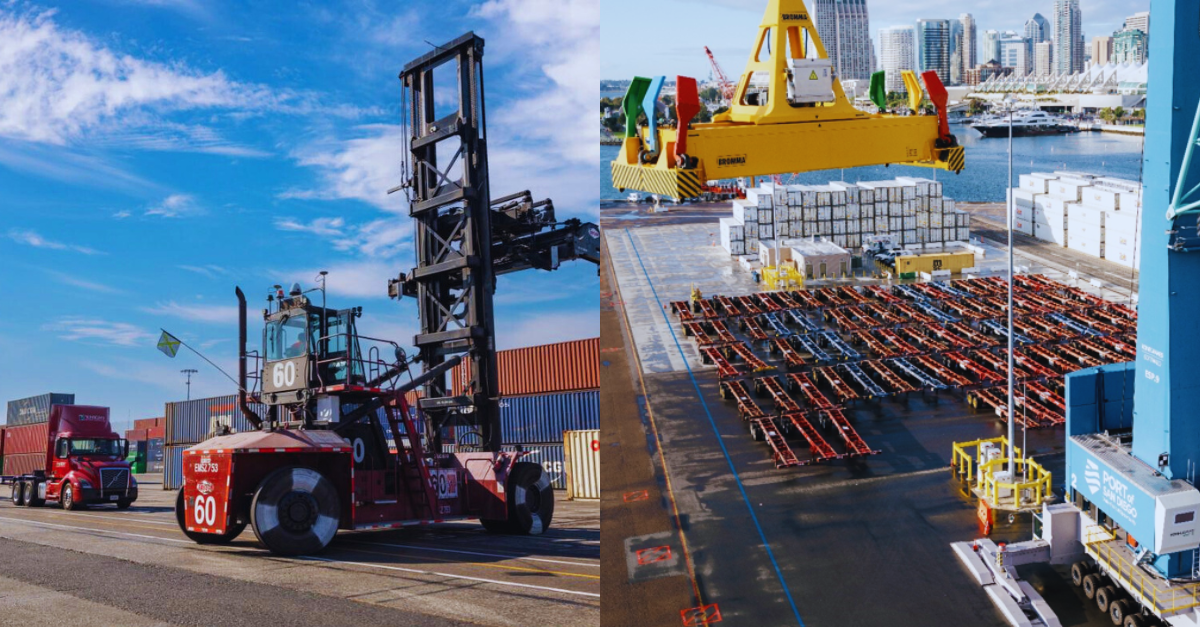California Ports Secure Historic Federal Grants for Zero-Emission Initiatives

In a significant boost to environmental efforts, two major California ports have successfully secured substantial federal grants from the U.S. Environmental Protection Agency (EPA). This funding is set to accelerate their zero-emission initiatives, bringing them closer to achieving global climate neutrality targets.
The Port of Los Angeles has received an unprecedented $412 million from the EPA’s Clean Ports Program, while the Port of San Diego has been awarded nearly $59 million for its San Diego Clean Cargo project. This project aims to electrify operations at the port’s two maritime cargo terminals and promote zero-emission freight movement.
To reach its goal of 100% zero-emission (ZE) terminal operations by 2030, the Port of Los Angeles, with support from the International Longshore and Warehouse Union (ILWU) and various private sector partners, applied for the EPA grant in May. The port collaborated with Yusen Terminals LLC, Everport Terminal Services, TraPac, Fenix Marine Services, APM Terminals, and the Harbor Community Benefit Foundation, backed by a coalition of over 100 elected officials and organizations focused on environmental justice and labor.
With the grant now approved, the Port of Los Angeles plans to contribute an additional $236 million alongside its private sector partners, bringing the total investment in zero-emission programs to an impressive $644 million. This funding will be utilized to purchase approximately 425 pieces of battery electric, human-operated zero-emission cargo-handling equipment, install an auto terminal vessel shore power AMP connection, create 300 new charging ports and related infrastructure, and deploy 250 ZE drayage trucks.
The anticipated outcome of this funding is a substantial reduction in port operation emissions, with estimates suggesting a decrease of 55 tons in nitrogen oxides (NOx) annually. Additionally, particulate matter (PM2.5) is expected to be reduced by 1.5 tons, and greenhouse gases (GHG) by 41,500 tons, while eliminating approximately 3.5 million gallons of diesel fuel usage each year.
California U.S. Senator Alex Padilla remarked, "The San Pedro Bay ports move the goods that power our economy. This historic investment of over $400 million in the Port of Los Angeles is a monumental step forward in accelerating the zero-emission infrastructure transition."
He further noted, "Thanks to the Inflation Reduction Act, we’re decarbonizing our supply chain to produce cleaner air and protect public health in Southern California communities while building toward our essential zero-emission goals."
Congresswoman Nanette Barragán emphasized that today’s funding announcement is the culmination of a five-year effort to collaborate with labor, environmental justice groups, and industry to secure billions for cleaning up ports nationwide. "This investment will significantly reduce pollution from ports and help our nearby port communities breathe cleaner air," she stated.
Mike Jacob, President of the Pacific Merchant Shipping Association, highlighted the importance of the EPA grant and matching funds, stating they could be pivotal in fully decarbonizing port operations. He noted, "These important funds underscore the progress made by the maritime industry in our long-term partnership with the Port of Los Angeles, resulting in diesel particulate matter reductions of -91% and sulfur oxides by -98% since 2005 in Southern California."
In a related development, the Port of Los Angeles recently engaged with international stakeholders at the Hamburg Sustainability Conference (HSC) on October 7-8, 2024, signing a declaration to decarbonize shipping and emphasizing the need for urgent action to support the industry’s net zero ambitions.
The Port of San Diego's Clean Cargo project, funded by an additional $28 million from various partners, including the San Diego Air Pollution Control District (APCD), Dole, PASHA, Skycharger, and SSA Marine, will bring the total project cost to $86 million. This initiative aims to significantly reduce emissions through key components such as:
- Upgrading the Tenth Avenue Marine Terminals’ electrical distribution system to support zero-emission electric equipment and shore power systems;
- Installing shore power systems for commercial harbor craft and ocean-going ships at TAMT;
- Establishing a proposed zero-emissions truck stop to serve the Port of San Diego’s maritime cargo terminals;
- Purchasing and deploying battery-electric zero-emissions equipment, including cargo handling equipment and heavy-duty trucks.
Congressman Scott Peters expressed his support for the Clean Ports Program, stating, "This award ensures that San Diego continues to be at the forefront of sustainable, efficient goods movement while improving air quality and supporting the health of our portside communities."
The foundation of the Port of San Diego’s cargo project includes several initiatives adopted over the past decade, such as the Maritime Clean Air Strategy (MCAS) and the Climate Action Plan (CAP), aimed at reducing greenhouse gas emissions and improving air quality.
The finalization of the grant agreement is already underway, with the project expected to commence in early 2025 and be completed by 2028. The EPA had announced two separate funding opportunities for U.S. ports earlier this year, with a total of $3 billion awarded to 55 applicants across 27 states, funded by the Inflation Reduction Act. This funding is projected to eliminate over 3 million metric tons of carbon pollution, equivalent to the annual energy use of 391,220 homes.